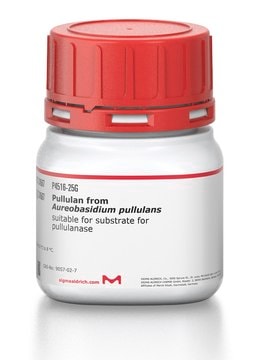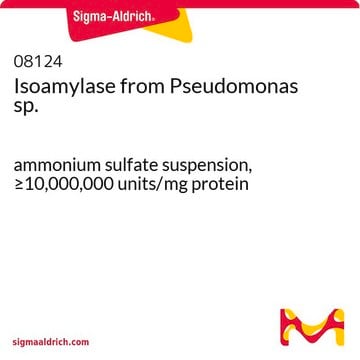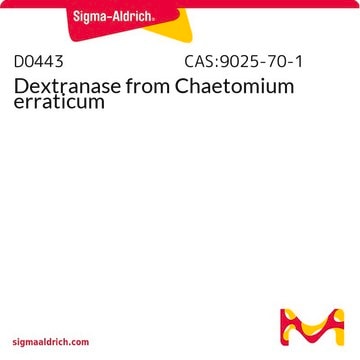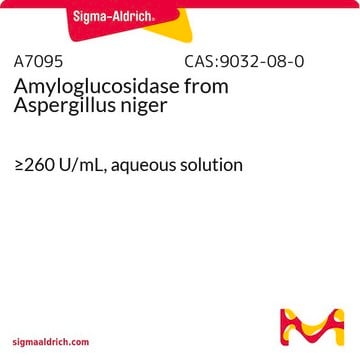E2412
Pullulanase microbial
Synonym(s):
Pullulanase microbial, Promozyme® D2
Sign Into View Organizational & Contract Pricing
All Photos(1)
About This Item
CAS Number:
MDL number:
UNSPSC Code:
12352204
NACRES:
NA.54
Recommended Products
recombinant
expressed in Bacillus subtilis
Quality Level
form
aqueous solution
specific activity
≥1000 NPUN/g
storage temp.
2-8°C
Application
Pullulanase is a glucanase that degrades pullulan. It is commonly used for starch-debranching as well as to study polysaccharide utilization.
Biochem/physiol Actions
Type I pullulanases specifically hydrolyse α-1,6 linkages, while type II pullulanases are also able to hydrolyse α-1,4 linkages.
Other Notes
View more information on enzymes for complex carbohydrate analysis at www.sigma-aldrich.com/enzymeexplorer
Legal Information
A product of Novozymes Corp.
Novozym is a registered trademark of Novozymes A/S
Promozyme is a trademark of Novozymes Corp.
Storage Class Code
12 - Non Combustible Liquids
WGK
WGK 1
Flash Point(F)
Not applicable
Flash Point(C)
Not applicable
Certificates of Analysis (COA)
Search for Certificates of Analysis (COA) by entering the products Lot/Batch Number. Lot and Batch Numbers can be found on a product’s label following the words ‘Lot’ or ‘Batch’.
Already Own This Product?
Find documentation for the products that you have recently purchased in the Document Library.
Customers Also Viewed
Nasima Chorfa et al.
Polymers, 14(10) (2022-05-29)
In this work, a valorization of the starch stemming from downgraded potatoes was approached through the preparation of starch nanoparticles using different physical methods, namely liquid and supercritical carbon dioxide, high energy ball milling (HEBM), and ultrasonication on the one
K A Smith et al.
Journal of bacteriology, 171(4), 2116-2123 (1989-04-01)
We have cloned a pullulanase gene from Bacteroides thetaiotaomicron. The pullulanase expressed from this clone in Escherichia coli was cell associated and soluble and had a molecular mass of 72 kilodaltons by gel filtration. Maxicell analysis of proteins coded by
Christopher C Ibenegbu et al.
Microbial cell factories, 21(1), 251-251 (2022-11-30)
The starch in waste bread (WB) from industrial sandwich production was directly converted to ethanol by an amylolytic, ethanologenic thermophile (Parageobacillus thermoglucosidasius strain TM333) under 5 different simultaneous saccharification and fermentation (SSF) regimes. Crude α-amylase from TM333 was used alone
Johanne Mørch Jensen et al.
Protein expression and purification, 79(2), 217-222 (2011-05-05)
The limit dextrinase inhibitor (LDI) from barley seeds acts specifically on limit dextrinase (LD), an endogenous starch debranching enzyme. LDI is a 14 kDa hydrophobic protein containing four disulfide bonds and one unpaired thiol group previously found to be either
Haixia Li et al.
Plant cell reports, 30(9), 1641-1659 (2011-05-11)
High temperature has adverse effects on rice yield and quality. The different influences of night high temperature (NHT) and day high temperature (DHT) on rice quality and seed protein accumulation profiles during grain filling in indica rice '9311' were studied
Our team of scientists has experience in all areas of research including Life Science, Material Science, Chemical Synthesis, Chromatography, Analytical and many others.
Contact Technical Service










